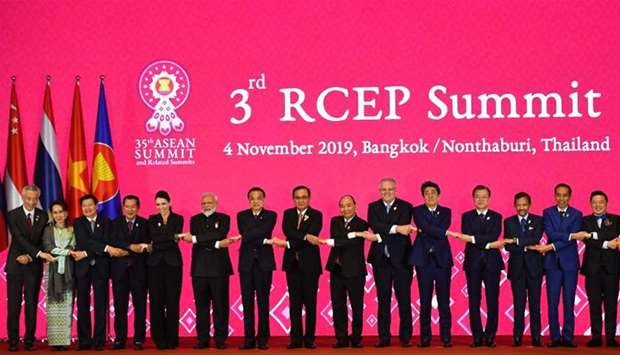India pulled out of a trade pact covering much of Asia, paving the way for 15 other countries to sign the China-backed regional trade deal next year.
India conveyed its decision to pull out of the Regional Comprehensive Economic Partnership, or RCEP, foreign ministry official Vijay Thakur Singh told reporters in Bangkok on Monday. The government took the decision in the national interest, she said.
Indian Prime Minister Narendra Modi decided not to join the deal in order to protect service workers and farmers, an official told reporters in New Delhi on Monday. India had pushed the other 15 nations to address its concern over deficits and open their markets to Indian services and investments, the official said.
“India has significant outstanding issues, which remain unresolved,” RCEP countries said in a joint statement on Monday. “All RCEP Participating Countries will work together to resolve these outstanding issues in a mutually satisfactory way.
India’s final decision will depend on satisfactory resolution of these issues.” India is welcome to join RCEP whenever it’s ready, Chinese Vice Foreign Minister Le Yucheng told reporters in Bangkok on Monday. Asian leaders had hoped to announce a breakthrough on the trade pact this week.
“It’s the 15 nations that have decided to move forward first,” Le said, adding that a few issues won’t be completed before the end of the year.
“There won’t be any problem for the 15 nations to sign RCEP next year,” he added. “We are taking an open attitude - whenever India is ready, it’s welcome to get onboard.” China has sought to accelerate the pact covering a third of the global economy as it faces slowing growth from a trade war with the US, which withdrew from the Trans-Pacific Partnership after Donald Trump took office in 2017.
A deal would further integrate Asia’s economies with China just as the Trump administration urges Asian nations to shun Chinese infrastructure loans and 5G technology.
India has long been the main holdout on due to domestic opposition over worries it would be flooded by cheap goods from China. It made last-minute demands in the run-up to the Bangkok meetings that ended up derailing the talks. The Philippines said on Saturday that negotiations wouldn’t be completed until February. Commerce Secretary Wilbur Ross, who is leading a downgraded US delegation to Asean, downplayed the significance of RCEP in an interview on Sunday. Most Southeast Asian leaders skipped a summit on Monday with US representatives after Trump decided to avoid the annual meetings for a second straight year.
“RCEP is not much of an agreement,” Ross told Bloomberg. “It’s not a free trade agreement, it’s not anything remotely like TPP, nor anything remotely like our separate arrangements with Japan and with South Korea. So I don’t think you want to blow that out of proportion. It’s a very low-grade treaty.”

